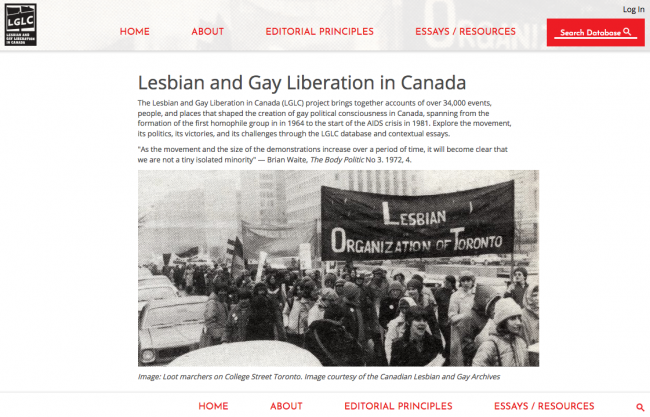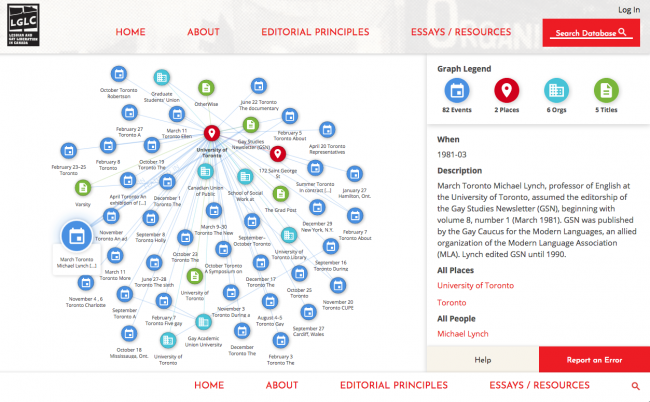
On April 30, 2019, the Centre for Digital Humanities (CDH), and Toronto Metropolitan University Library, hosted Digital Diversity @ Ryerson, a symposium that highlighted the launch of the Lesbian and Gay Liberation in Canada (LGLC) website. The new resource provides online access to a significant collection of information that chronicles the lesbian and gay liberation movement from its inception in 1964, with the formation of the first gay liberation organization, to the 1981 AIDS crisis.
The completion of the digital project has been five years in the making, unless you consider the text on which it’s based. Then, all in, it’s been over two decades of work chronicling a movement and transcribing it into digital format.
In 1996, Don McLeod, a Librarian at the University of Toronto published volume one of a ground-breaking two volume set titled Lesbian and Gay Liberation in Canada. The book methodically chronicles ‘the people, places, legislation, protests, publications and organizations that defined the LGBT movement in Canada’ from 1964 to 1975.
The second volume of this impeccable historical achievement, covering 1976 to 1981, wouldn’t be published for another 20 years. Together, the volumes represent a remarkable undertaking that provides a detailed account of people, places and events spanning 17 years of a movement that brought an enormous amount of awareness and change to Canadians, and Canadian culture and society.
In 2011, five years before the second volume was to be published in 2016, Michelle Schwartz, a Librarian and Researcher from New York who had recently relocated to Toronto, was working at Ryerson and volunteering at the Canadian Lesbian and Gay Archives [now the ArQuives]. At Ryerson she met Ryerson-York PhD candidate Constance Crompton, and the two decided to join forces to begin encoding McLeod’s work into digital format, with the intent of creating an accessible online resource.
“At the time, I was volunteering at the Canadian Lesbian and Gay Archives, and had become familiar with McLeod’s book as a key reference work for researchers in LGBTQ history” says Schwartz. “Constance was working on another digital project, the Yellow Nineties, and we often talked about how McLeod’s chronology was the perfect candidate for digitization. Having the text in a digital format would allow us to ask all sorts of questions about the data contained in the book that wouldn’t be possible with a paper copy.”
In 2014, Schwartz and Crompton secured Social Sciences and Humanities Research Council (SSHRC) funding for the project. Crompton, who had since graduated and was now a faculty member at UBC’s Okanagan campus, had remained in contact with her Ryerson PhD supervisor Lorraine Janzen Kooistra from the Department of English and the founding Co-Director of CDH. Janzen Kooistra had been a supporter of the LGLC project from the beginning, encouraging and collaborating on its development. CDH had been established in 2012 (it is now housed on the 4th floor of the Library) with a mission to engage “in collaborative transdisciplinary scholarship, research, and creativity (SRC) at the critical intersection of the material and the digital, contributing to scholarly and societal knowledge about cultural objects, makers, and communities.” The LGLC project checked all the boxes for CDH and as the project grew, so too did support from the CDH community. Janzen Kooistra notes, “all members of the CDH community—students, faculty, staff, librarians, and partners—have benefited enormously from the opportunity to collaborate on this ground-breaking, intersectional and interdisciplinary project in open public scholarship.”

Over the course of the next five years, Schwartz and Crompton–with the help of undergraduate and graduate research assistants from Ryerson, University of British Columbia Okanagan, University of Ottawa, and Simon Fraser University–would create a remarkable database of McLeod’s work. The project, while transcribing the published text into a digital format, also set out to build on the books. Schwartz and Crompton note, “we have both expanded Don McLeod’s pioneering content and provided new ways of searching and organizing it,” adding that “the publicly accessible website (lgcl.ca) provides users with access to interconnected links with location information for the places mentioned, biographical information of the people involved, and citations drawn from periodicals, newsletters, and archival sources.”
As the project came to fruition it required a platform on which it could be supported. Schwartz and Crompton reached out to Toronto Metropolitan University Library’s Chief Librarian, Carol Shepstone and the Head of Library Information Technology Services, Fangmin Wang. As a leader in adopting emerging technology and building innovative programming and services, the Library welcomed the opportunity to partner with CDH, and Schwartz and Crompton, to provide a platform and hosting support. In addition to hosting the website the Library’s expertise in digital publishing and scholarship gave the project additional backing in relation to developing and sustaining an open access publication. The partnership between CDH, the Library, and the LGLC project team, was an ideal fit.
Now complete, the LGLC website is a robust online resource built from and extending McLeod’s original work. It consists of over 34,000 enriched records of people, places, and events; includes additional social aspects of Canadian LGBTQ history, such as poetry readings, protests, legislative change and book launches; and highlights that the gay liberation movement did not exclusively take place in urban centers. In fact, the LGLC site references 350 cities, 900 locations, and 3,430 people.
A key feature of the site is the ability for users to chart their own path through the movement, uncovering stories of a particular person, city, organization, or year.
Reflecting on the value and depth of the project, Chief Librarian Carol Shepstone notes “the Library is thrilled to partner and support this important scholarly and community resource, which contributes to centring LGBTQ history in Canada.”
After two decades of work, the volumes and the collaborative project mark an enormous accomplishment, which details an important period of history and provides an accessible resource pertinent to Canadian culture and society